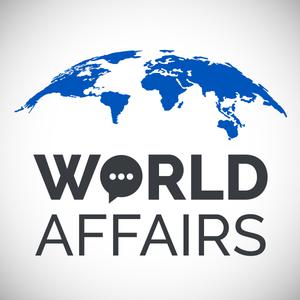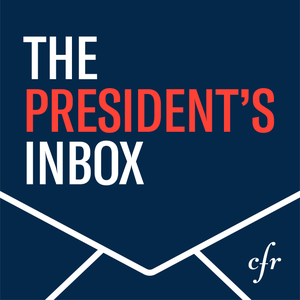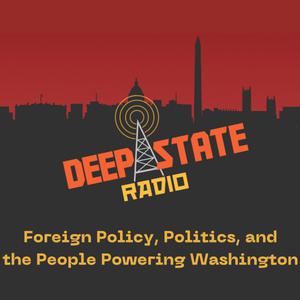
World Class
World Class
Podcast from the Freeman Spogli Institute for Int…
- 26 minutes 24 secondsVladimir Kara-Murza on the Future of Russian Democracy
Vladimir Kara-Murza is a Russian politician, author, historian, and former political prisoner. A close colleague of the slain opposition leader Boris Nemtsov, he has served as deputy leader of the People’s Freedom Party and was a candidate for the Russian Parliament. Leading diplomatic efforts on behalf of the opposition, Kara-Murza played a key role in the adoption of Magnitsky sanctions against top Russian officials by the United States, United Kingdom, European Union, Canada, and Australia. For this work he was twice poisoned and left in a coma; a joint media investigation by Bellingcat, The Insider, and Der Spiegel has identified FSB officers behind the attacks.
In April 2022 Kara-Murza was arrested in Moscow for his public denunciation of the invasion of Ukraine and of the war crimes committed by Russian forces. Following a closed-door trial at the Moscow City Court, he was sentenced to 25 years for “high treason” and kept in solitary confinement at a maximum-security prison in Siberia. He was released in August 2024 as part of the largest East-West prisoner exchange since the Cold War negotiated by the U.S. and German governments.
Kara-Murza is a contributing writer at the Washington Post, winning the 2024 Pulitzer Prize for his columns written from prison, and has previously worked for Echo of Moscow, BBC, RTVi, Kommersant, World Affairs, and other media organizations. He has directed three documentary films and is the author or contributor to several books on Russian history and politics.
Kara-Murza currently serves as vice-president at the Free Russia Foundation, as senior advisor at Human Rights First, and as senior fellow at the Raoul Wallenberg Centre for Human Rights. He was the founding chairman of the Boris Nemtsov Foundation for Freedom and has led successful international efforts to commemorate Nemtsov, including with street designations in Washington D.C. and London. Kara-Murza is a recipient of several awards, including the Council of Europe’s Václav Havel Human Rights Prize, and is an honorary fellow at Trinity Hall, Cambridge. He holds an M.A. (Cantab.) in History from Cambridge. He is married, with three children.
If you like what you hear, you can get additional content from scholars at the Freeman Spogli Institute for International Studies by following us on X, Facebook, LinkedIn, Instagram, YouTube, and by subscribing to our newsletters and updates.
13 December 2024, 9:00 pm - 27 minutes 28 secondsWhatever Victory Takes: Ambassador Audra Plepytė on Support for Ukraine
Audra Plepytė was appointed as Lithuania’s Ambassador to the United States of America and to the United Mexican States in 2021. Before this she was a Lithuanian Permanent Representative to the United Nations where she facilitated several negotiations, led the Group of Friends, and was elected to executive bodies of UN instruments and institutions, including being elected as the President of the Executive Board of the United Nations Children’s Fund (UNICEF) in 2021. As a career diplomat for over 30 years, she has held numerous positions within the Lithuanian Ministry of Foreign Affairs, dealing with bilateral and multilateral issues, heading the European Union Department (2014–2017), the Personnel Department, and International Missions and Conflict Prevention Division.
If you like what you hear, you can get additional content from scholars at the Freeman Spogli Institute for International Studies by following us on X, Facebook, LinkedIn, Instagram, YouTube, and by subscribing to our newsletters and updates.
8 November 2024, 11:30 pm - 35 minutes 2 secondsGlobal Threats Today: The 2024 Edition
This audio was originally recorded on October 26, 2024 during the event, “Global Threats Today: What's At Stake and What We Can Do About It,” held during Stanford University's annual Reunion and Homecoming weekend in affiliation with the Stanford Alumni Association.
Featuring:
Michael McFaul, Director and Senior Fellow at the Freeman Spogli Institute for International Studies; the Ken Olivier and Angela Nomellini Professor of International Studies in the Department of Political Science; the Peter and Helen Bing Senior Fellow at the Hoover Institution; and former U.S. Ambassador to Russia.
Marshall Burke, Deputy Director at the Center on Food Security and the Environment; an associate professor in the Doerr School of Sustainability, and a Senior Fellow at the Freeman Spogli Institute for International Studies, the Stanford Woods Institute for the Environment, and the Stanford Institute for Economic Policy Research.
Oriana Skylar Mastro, Center fellow at the Freeman Spogli Institute for International Studies and courtesy assistant professor of Political Science; active service in the United States Air Force Reserve, where she works at the Pentagon as deputy director of Reserve China Global Strategy
Didi Kuo, Center Fellow at the Freeman Spogli Institute for International Studies and associate director for research at its Center on Democracy, Development, and the Rule of Law.
Amichai Magen, the inaugural Visiting Fellow in Israel Studies at the Freeman Spogli Institute for International Studies; In Israel, a senior lecturer (U.S. associate professor), head of the MA Program in Diplomacy & Conflict Studies, and director of the Program on Democratic Resilience and Development (PDRD) at the Lauder School of Government, Diplomacy and Strategy, Reichman University.
Steven Pifer, affiliate at the Center for International Security and Cooperation and The Europe Center at the Freeman Spogli Institute for International Relations; former U.S. Ambassador to Ukraine and member of the U.S. Foreign Service.
If you like what you hear, you can get additional content from scholars at the Freeman Spogli Institute for International Studies by following us on X, Facebook, LinkedIn, Instagram, YouTube, and by subscribing to our newsletters and updates.
31 October 2024, 7:15 pm - 34 minutes 47 secondsAn Inside Look at Policymaking with Susan E. Rice
Susan E. Rice served as domestic policy advisor to President Joe Biden. Previously, she was President Barack Obama's National Security Advisor and U.S. Permanent Representative to the United Nations and a member of the Cabinet. During the Clinton Administration, Rice was U.S. Assistant Secretary of State for African Affairs, as well as Special Assistant to the President and Senior Director for African Affairs, and Director for International Organizations and Peacekeeping at the National Security Council.
An alumna of Stanford (History, '86), Susan Rice returned to campus during spring 2024 as the Bernard and Susan Liautaud Visiting Fellow at the Freeman Spogli Institute for International Studies, with simultaneous affiliations with the Institute’s Center for International Security and Cooperation (CISAC), the Center on Democracy, Development and Rule of Law (CDDRL), and the Cyber Policy Center (CPC), where she focused on the issue of governance of artificial intelligence.
If you like what you hear, you can get additional content from scholars at the Freeman Spogli Institute for International Studies by following us on X, Facebook, LinkedIn, Instagram, YouTube, and by subscribing to our newsletters and updates.
17 July 2024, 5:00 pm - 17 minutes 53 secondsThe View on Russia from Estonia
Kristjan Prikk has served as Estonia´s Ambassador to the United States since May 2021. This is his third diplomatic posting to Washington, D.C. Before assuming his current duties, Prikk served for nearly three years as the Permanent Secretary of the Estonian Ministry of Defense. In this role he was responsible for the management of the Ministry and for the coordination of activities of the agencies under the Ministry, including the Estonian Defense Forces, the Estonian Foreign Intelligence Service, and the Centre for Defense Investments.
The audio for this podcast originally came from an event hosted on May 29, 2024 by Stanford Libraries, Stanford's Center for Russian, East European and Eurasian Studies (CREEES), and the Freeman Spogli Institute for International Studies (FSI).
CORRECTION: During his remarks, the Ambassador of Estonia cited news that referred to Dmitry Trenin as the person suggesting that Russia should conduct a “demonstrative” nuclear test to deter the West from allowing Ukraine to aim at targets on Russian territory. In fact, it was Dmitry Suslov who had suggested this. See more: https://www.reuters.com/world/europe/think-tank-close-kremlin-says-russia-should-consider-demonstrative-nuclear-2024-05-29/
If you like what you hear, you can get additional content from scholars at the Freeman Spogli Institute for International Studies by following us on X, Facebook, LinkedIn, Instagram, YouTube, and by subscribing to our newsletters and updates.
17 June 2024, 3:00 pm - 29 minutes 21 secondsStrategic Responsibility in the EU, United States, and Beyond
Josep Borrell serves as the High Representative of the European Union for Foreign Affairs and Security Policy. He previously served as President of the European Parliament from 2004 to 2007 and as Minister of Foreign Affairs, European Union and Cooperation in the Government of Spain from 2018 to 2019. He is an alumnus of Stanford University (M.S. '75) with a degree in applied mathematics (operations research).
Michael McFaul is the director of the Freeman Spogli Institute for International Studies at Stanford University. He joined the Stanford faculty in 1995, and currently sits as the Ken Olivier and Angela Nomellini Professor of International Studies in the Department of Political Science, and the Peter and Helen Bing Senior Fellow at the Hoover Institution. From 2009 to 2012, he served as Special Assistant to the President and Senior Director for Russian and Eurasian Affairs at the National Security Council at the White House, and from 2012 to 2014 was appointed as U.S. Ambassador to the Russian Federation.
If you like what you hear, you can get additional content from scholars at the Freeman Spogli Institute for International Studies by following us on X, Facebook, LinkedIn, Instagram, YouTube, and by subscribing to our newsletters and updates.
6 June 2024, 7:30 pm - 28 minutes 9 secondsGlobal Security Lies in Human Security, Says Oleksandra Matviichuk
Matviichuk originally delivered this speech at the 2024 S.T. Lee Lecture hosted by the Center on Democracy, Development and the Rule of Law at Stanford University.
Oleksandra Matviichuk is a human rights lawyer focused on issues within Ukraine and the OSCE region. She is the head of the Center for Civil Liberties, which was a co-recipient of the 2022 Nobel Peace Prize. The organization supports legislative reforms, monitors law enforcement and judiciary, conducts wide education programs, and leads international solidarity efforts.
If you like what you hear, you can get additional content from scholars at the Freeman Spogli Institute for International Studies by following us on X, Facebook, LinkedIn, Instagram, YouTube, and by subscribing to our newsletters and updates.
30 April 2024, 3:00 pm - 20 minutes 49 secondsThe Widening Cracks in Iran's Regime
Abbas Milani is the Hamid and Christina Moghadam Director of Iranian Studies at Stanford University and a visiting professor in the department of political science. In addition, Dr. Milani is a research fellow and co-director of the Iran Democracy Project at the Hoover Institution.
Michael McFaul is the host of World Class and director of the Freeman Spogli Institute for International Studies at Stanford University, where he is also the Ken Olivier and Angela Nomellini Professor of International Studies in the Department of Political Science, and the Peter and Helen Bing Senior Fellow at the Hoover Institution. From 2009 to 2012, he worked as the Special Assistant to the President and Senior Director for Russian and Eurasian Affairs at the National Security Council during the Obama administration, and from 2012 to 2014 served as the U.S. Ambassador to the Russian Federation.
If you like what you hear, you can get additional content from scholars at the Freeman Spogli Institute for International Studies by following us on X, Facebook, LinkedIn, Instagram, YouTube, and by subscribing to our newsletters and updates.
21 March 2024, 12:00 am - 1 hour 10 minutesThe War in Ukraine at Two Years
Michael McFaul is joined by:
Oleksiy Honcharuk, who served as the 17th prime minister of Ukraine from 2019-2020, during which time he introduced important policy initiatives in Ukraine including the institution of business privatization processes, efforts to combat black markets, and the launch of the Anti-Raider Office to respond to cases of illegal property seizures. Prior to serving as prime minister, Honcharuk was deputy head of the Presidential Office of Ukraine and was a member of the National Reforms Council under the president of Ukraine. In 2021, he was the Bernard and Susan Liautaud Visiting Fellow at the Freeman Spogli Institute for International Studies (FSI).
Serhiy Leshchenko, formerly a journalist with Ukrainska Pravda and member of Ukrainian Parliament (2014-2019). He first rose to political prominence during Ukraine’s 2014 Maidan Revolution, and has continued to serve in government and civil society since. He is an advisor to President Volodymyr Zelenskyy’s chief-of-staff, working and living in the governmental bunkers during the start of Russia's invasion and siege on Kyiv in 2022. He is an alumnus of the 2013 cohort of the Draper Hills Summer Fellows program (now the Fisher Family Summer Fellows Program) at FSI’s Center on Democracy, Development and the Rule of Law at Stanford University.
Oleksandra Matviichuk, a human rights advocate and founder of the Center for Civil Liberties, which was recognized as a co-recipient of the 2022 Nobel Peace Prize. The mission of the Center for Civil Liberties is to protect human rights and establish democracy in Ukraine and the OSCE region. The organization develops legislative proposals, exercises public oversight over law enforcement agencies and judiciary, conducts educational activities for young people, and implements international solidarity programs. Matviichuk was a visiting scholar from 2017-2018 with the Ukrainian Emerging Leaders Program at the Center on Democracy, Development and the Rule of Law.
Oleksandra Ustinova, who serves as the People's Deputy of Ukraine and a member of Ukraine’s parliament. Since the beginning of Russia's invasion in 2022, she has met repeatedly with lawmakers in the United States to advocate on behalf of Ukraine, including an address before the U.S. House of Representatives on February 28, 2022. Prior to her government service, Ustinova was the head of communications and anti-corruption in healthcare projects at the Anti-Corruption Action Center (ANTAC), one of the leading organizations on anti-corruption reform in Ukraine. She was a visiting scholar with the Ukrainian Emerging Leaders Program at the Center on Democracy, Development and the Rule of Law from 2018-2019.
If you like what you hear, you can get additional content from scholars at the Freeman Spogli Institute for International Studies by following us on X, Facebook, LinkedIn, Instagram, YouTube, and by subscribing to our newsletters and updates.
24 February 2024, 10:35 pm - 45 minutes 22 secondsSean Penn on Ukraine's "Superpower"When Academy Award-winning actor Sean Penn set off to make a documentary about Ukraine, he thought he would be telling the story of a comedic showman-turned president named Volodymyr Zelenskyy and the young democracy that had elected him. Instead, Penn found himself witnessing the start of a horrific war of aggression. Sean Penn joined Michael McFaul at Stanford University for a special screening of "Superpower," a film co-directed by Penn and Aaron Kaufman about the days leading up to and immediately following Russia's full-scale invasion of Ukraine in February 2022. During their discussion, Penn shares what it was like to be an accidental witness to history, and the inspiration he continues to take from President Zelenskyy, Ukrainians, and their fight for freedom. Natalia Antelava, editor-in-chief of Coda Story and a John S. Knight Journalism fellow at Stanford, moderates the conversation.If you like what you hear, you can get additional content from scholars at the Freeman Spogli Institute for International Studies by following us on X, Facebook, LinkedIn, Instagram, YouTube, and by subscribing to our newsletters and updates.1 February 2024, 12:00 am
- 1 hour 20 minutesHow Did We Get Here? A Conversation on the Crisis in the Middle EastTo understand why the conflict in Gaza is so complex, you have to understand the history of Israel's relationship with Palestine and Hamas well before October 7, 2023. In this episode of World Class, we bring you a conversation with Ambassador Dennis Ross and Ghaith al-Omari, two experts on the Middle East, who help contextualize the current situation in Gaza, offer a framework for how to understand the conflict between Israel and Hamas, and share their thoughts on what it will take to bring stability to the region. Their discussion is moderated by Janine Zacharia, a lecturer in the Department of Communication at Stanford University. Ambassador Dennis Ross is the counselor and William Davidson Distinguished Fellow at the Washington Institute for Near East Policy, and teaches at Georgetown University’s Center for Jewish Civilization. For more than twelve years, Ambassador Ross played a leading role in shaping U.S. involvement in the Middle East peace process, dealing directly with the parties as the U.S. point man on the peace process in both the George H.W. Bush and Bill Clinton administrations. Ghaith al-Omari, the Rosalinde and Arthur Gilbert Foundation Senior Fellow in The Washington Institute's Irwin Levy Family Program on the U.S.-Israel Strategic Relationship, is the former executive director of the American Task Force on Palestine. He served as advisor to the negotiating team during the 1999–2001 permanent-status talks in addition to holding various other positions within the Palestinian Authority.If you like what you hear, you can get additional content from scholars at the Freeman Spogli Institute for International Studies by following us on X, Facebook, LinkedIn, Instagram, YouTube, and by subscribing to our newsletters and updates.18 December 2023, 8:30 pm
- More Episodes? Get the App
Your feedback is valuable to us. Should you encounter any bugs, glitches, lack of functionality or other problems, please email us on [email protected] or join Moon.FM Telegram Group where you can talk directly to the dev team who are happy to answer any queries.
 WorldAffairs
WorldAffairs
 The President’s Inbox
The President’s Inbox
 Deep State Radio
Deep State Radio
 The Lawfare Podcast
The Lawfare Podcast
 Intelligence Squared
Intelligence Squared
 The Brookings Cafeteria
The Brookings Cafeteria